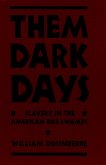One soldier's eloquent, descriptive letters to his family offering a personal view of the devastating assault
In Days of Destruction, editors W. Eric Emerson and Karen Stokes chronicle the events of the siege of Charleston, South Carolina, through a collection of letters written by Augustine Thomas Smythe, a well-educated young man from a prominent Charleston family. The vivid, eloquent letters he wrote to his family depict all that he saw and experienced during the long, destructive assault on the Holy City and describe in detail the damage done to Charleston's houses, churches, and other buildings in the desolated shell district, as well as the toll on human life.
Smythe's role in the Civil War was different from that of his many companions serving in Virginia and undoubtedly different from anything he could have imagined when the war began. Aftera baptism in blood at the Battle of Secessionville, South Carolina, Smythe was assigned to the Confederate Signal Corps. He served on the ironclad CSS Palmetto State and then occupied a post high above Charleston in the steeple of St. Michael's Episcopal Church. From behind a telescope in his lofty perch, he observed the fierce attacks on Fort Sumter, the effects of the unrelenting shelling of the city by enemy guns at Morris Island, and the naval battles and operations in the harbor, including the actions of the Confederate torpedo boats and the H. L. Hunley submarine.
The Confederate Signal Corps played a vital role in the defense of Charleston and its environs, and Smythe's letters, perhaps more than any other first-person account, detail the daily life and service experiencesof signalmen in and around the city during the war. For more than eighteen months, Smythe's neighborhood south of Broad Street, one of the city's oldest and wealthiest communities, was abandoned by the great majority of its residents. His letters provide the reader with an almost postapocalyptic perspective of the oftentimes quiet, and frequently lawless, street where he lived before and during the siege of Charleston.
In Days of Destruction, editors W. Eric Emerson and Karen Stokes chronicle the events of the siege of Charleston, South Carolina, through a collection of letters written by Augustine Thomas Smythe, a well-educated young man from a prominent Charleston family. The vivid, eloquent letters he wrote to his family depict all that he saw and experienced during the long, destructive assault on the Holy City and describe in detail the damage done to Charleston's houses, churches, and other buildings in the desolated shell district, as well as the toll on human life.
Smythe's role in the Civil War was different from that of his many companions serving in Virginia and undoubtedly different from anything he could have imagined when the war began. Aftera baptism in blood at the Battle of Secessionville, South Carolina, Smythe was assigned to the Confederate Signal Corps. He served on the ironclad CSS Palmetto State and then occupied a post high above Charleston in the steeple of St. Michael's Episcopal Church. From behind a telescope in his lofty perch, he observed the fierce attacks on Fort Sumter, the effects of the unrelenting shelling of the city by enemy guns at Morris Island, and the naval battles and operations in the harbor, including the actions of the Confederate torpedo boats and the H. L. Hunley submarine.
The Confederate Signal Corps played a vital role in the defense of Charleston and its environs, and Smythe's letters, perhaps more than any other first-person account, detail the daily life and service experiencesof signalmen in and around the city during the war. For more than eighteen months, Smythe's neighborhood south of Broad Street, one of the city's oldest and wealthiest communities, was abandoned by the great majority of its residents. His letters provide the reader with an almost postapocalyptic perspective of the oftentimes quiet, and frequently lawless, street where he lived before and during the siege of Charleston.
Dieser Download kann aus rechtlichen Gründen nur mit Rechnungsadresse in A, D ausgeliefert werden.









